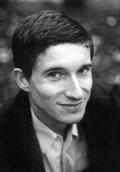Greif, Hajo | Germany

Born 1968 in Frankfurt am Main, Germany, Hajo Greif studied philosophy, cultural anthropology and sociology at J.W. Goethe Universität, Frankfurt, from which he graduated in 1997. His graduate studies and research focused on the philosophy and sociology of science, particularly the biological sciences, as well as on the analytical philosophy of mind and language.
After some professional training and work in the media, along with part-time academic activities, Hajo Greif joined the Graduiertenkolleg (graduate college) "Technisierung und Gesellschaft", Technische Universität Darmstadt, Germany, as a doctoral fellow in 2000. in August 2003 he submitted his thesis entitled "Wer spricht im Parlament der Dinge? Über die Idee einer nicht-menschlichen Handlungsfähigkeit" ("Who speaks in the Parliament of Things? On the idea of non-human agency").
In 2001, he was a visiting fellow at the Science Studies Unit, University of Edinburgh, Scotland, UK, working with David Bloor. He was a fellow at the IAS-STS from October 2003 until June 2004.
Project at IAS-STS: Darwinizing Our Selves. The evolutionary making of modern man
Divisions in the current debates about modern genetics-based life sciences mostly follow the fault-line supposed to separate two distinct and antagonistic concepts of human nature: One faction (sociobiology and related theories) is held to follow a scientistic, reductionist naturalism aligning itself with the Darwinian tradition, affirming various kinds of engineering approaches to human nature and defining the human condition in terms of environmental fitness. On the other side, in the humanities and among some evolutionary theorists, we find critical accounts rejecting the aforementioned kind of naturalism, endorsing instead a view of human nature as being inherently and irreducibly cultural, based on the distinctive properties of the human self as rational and autonomous, notwithstanding the fact that it has indeed evolved.
The irony about this antagonism, as will be shown, is that it seriously (and symmetrically) misrepresents Darwinian naturalism. Firstly, Darwinism is the paradigm of applying the very concept of the modern, enlightened self—to which the latter faction appeals in order to criticise naturalism—to animate nature. Secondly, the currently prevailing reductionist interpretation of Darwinism undermines the concept of the self implemented in its very theoretical foundations by way of extending its range of application—namely to the genes. The main purpose of this research project in the philosophy and history of biology is to take a close look at the emergence and development of Darwinism, focusing on how the enlightenment concept of the self is reflected in Darwinian theory-building, in order to support an alternative approach to the dead-locked debates between naturalism and culturalism. This approach will affirm naturalism as well as it takes seriously some of the epistemic and normative implications of Darwinian thinking easily ignored by the dominant faction of modern-day Darwinists.
Selected Publications
Hajo Greif: "Versuche, die Welt zurückzugewinnen. Die Kontroverse über die 'Handlungsfähigkeit der Dinge' in den Science and Technology Studies"; in: Claus Zittel (ed.): Wissen und soziale Konstruktion in Geschichte, Kultur und Wissenschaft. Auseinandersetzungen mit dem Sozialkonstruktivismus; Berlin: Akademie-Verlag, 2002 (on the agency-of-things debate in STS).
Kai-Uwe Bux and Hajo Greif: "Ja, Der Da hat es gesagt. Über den dekonstruktiven Umgang mit Texten"; in: Deutsche Zeitschrift für Philosophie, Vol. 50, 1 / 2002 (a critical essay on Derrida and deconstructivism).
Hajo Greif and Doris Dehn: "Was die Welt wert ist"; in: Christoph Görg et al. (eds): Zugänge zur Biodiversität; Marburg: Metropolis, 1999 (on theoretical issues in biodiversity assessment).
Arbeitsgruppe Biopolitik (Michael Weingarten, Hajo Greif et al.): "Vieles ist verschieden: Biodiversität in den Biowissenschaften"; in: Michael Flitner et al. (eds): Konfliktfeld Natur. Biologische Ressourcen und globale Politik; Opladen: Leske & Budrich, 1998 (a critical approach to the concept of biodiversity).
Conference Papers
Hajo Greif: "Selfish Genes, Treacherous Bacteria. Concepts of Non-Human Agency in Evolutionary Biology and Science & Technology Studies"; paper given at the Annual Meeting of the Society for the Social Studies of Science (4S), Milwaukee, WI, USA, November 2002.
